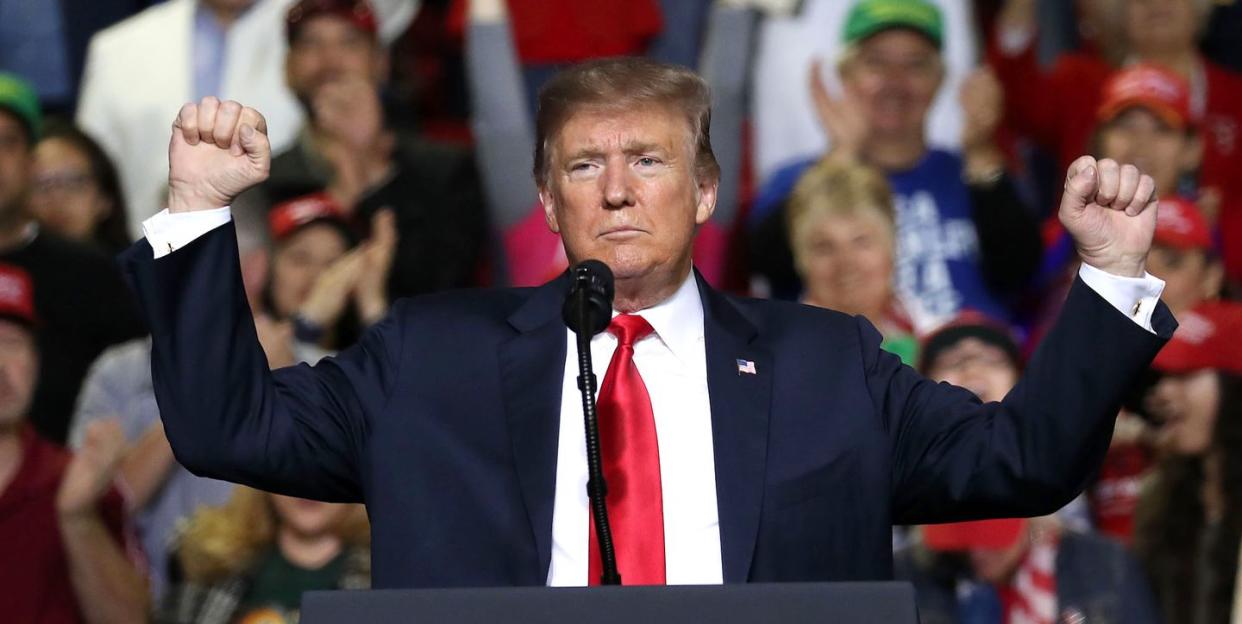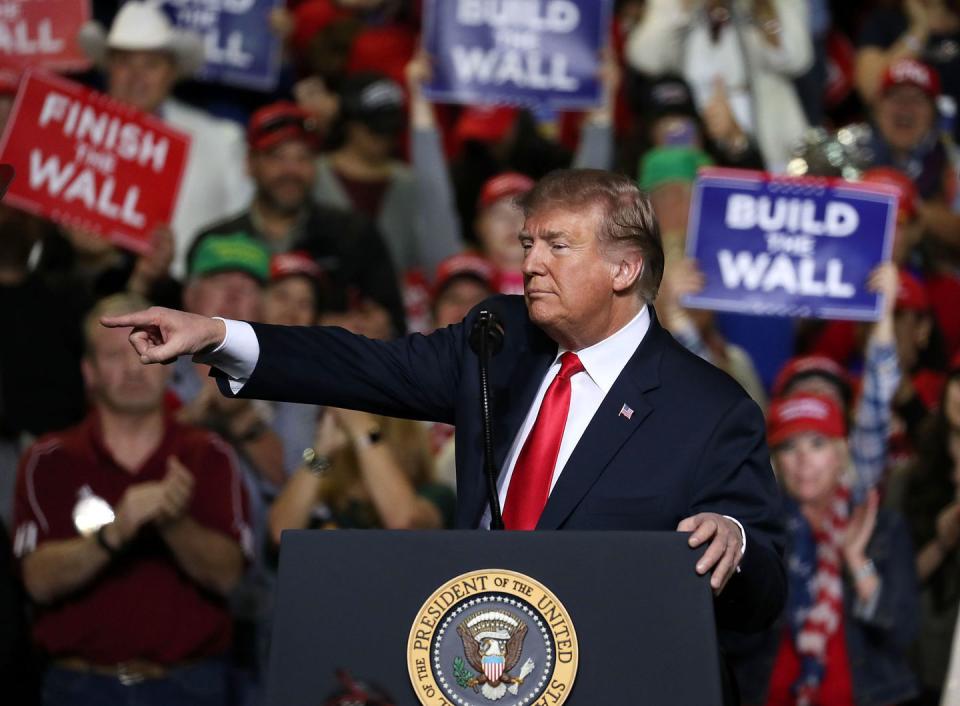Trump's Authoritarian Rhetoric About Political Violence Just Went to Another Level

Authoritarianism is a slip and a slide, inch by inch, as a leader slowly backs an SUV over the republic of which citizens handed him control. The goal is to move the window of what is acceptable to talk about slowly but decisively, until what you talked about becomes something that can be done. It might feel like the same old thing over and over, but there are new elements each time, a new outrage to digest until it becomes an old outrage and, ultimately, a part of life.
This has been a banner week for democratic backsliding. On Wednesday, Donald Trump, American president, gave an interview to Breitbart, the once-prominent right-wing content machine that was caught laundering white-nationalist propaganda into the mainstream. In the interview, he hits a familiar refrain-but ratchets things up a notch.
“You know, the left plays a tougher game, it’s very funny. I actually think that the people on the right are tougher, but they don’t play it tougher. OK? I can tell you I have the support of the police, the support of the military, the support of the Bikers for Trump-I have the tough people, but they don’t play it tough-until they go to a certain point, and then it would be very bad, very bad. But the left plays it cuter and tougher. Like with all the nonsense that they do in Congress … with all this invest[igations]-that’s all they want to do is -you know, they do things that are nasty. Republicans never played this.
Leave aside, for a moment, the scattergun syntax and the deeply preposterous idea the Republican Benghazi Party doesn't like itself a congressional investigation. That part in bold is the real deal: Here is the president hinting his political opposition could be met with force if "they go to a certain point." What is the "certain point"? Impeachment? defeating him in the 2020 presidential election? Merely continuing to investigate him in Congress?

He mentions Bikers for Trump, implying there are civilian groups who could use violence to protect him. This sounds familiar, and armed civilians have already taken to the streets, chanting his name and attacking people. He mentions police, who are tasked with keeping order in those streets, but whom he believes would back him in some nonspecific-but clearly defined-confrontation.
And he mentions the military acting in an overtly political context to safeguard The Leader against undesirable political outcomes. It is farfetched to think the military would back a coup, considering his approval numbers with active-duty members. But this may at some point require someone, at some level in the chain of command, to disregard orders. When he sent troops to the southern border as an expressly political stunt ahead of the midterms, the orders were followed.
This is actually not the first time Trump has spoken in these terms. He said something similar at a midterm rally in September:
They’re so lucky that we’re peaceful. Law enforcement, military, construction workers, Bikers for Trump-how about Bikers for Trump? They travel all over the country. They got Trump all over the place, and they’re great. They’ve been great. But these are tough people. These are great people. But they’re peaceful people, and Antifa and all-they’d better hope they stay that way. I hope they stay that way. I hope they stay that way.
Trump is careful to suggest he wouldn't like this outcome, while ushering it into possibility. This is a cherished device for him. He's said he "hates these people," referring to journalists, but "would never kill them." He pretends he doesn't want these things to happen while planting the ideas in people's heads. In February, a Red Hat who'd been worked up into a frenzy attacked a BBC reporter at a rally. Sometimes, Trump embraces the violence outright-like when he praised a political ally for assaulting a reporter, or when he offered to pay supporters' legal bills if they attacked protesters. And of course, he once suggested "Second Amendment people" could find a solution should Hillary Clinton win and nominate judges who might allow a modest measure of gun control in this country.
Just attended my first @realDonaldTrump rally where my colleague BBC cameraman Rob Skeans was attacked by a Trump supporter. The crowd had been whipped up into a frenzy against the media by Trump and other speakers all night #TrumpElPaso pic.twitter.com/Oiw8osPms3
- Eleanor Montague (@EleanorMontague) February 12, 2019
This embrace of political violence has had an undoubted effect, and not just in Charlottesville. A die-hard Trump fan was arrested in Florida after he sent bombs to CNN and Democratic figures-some of the most consistent targets for the president's vitriol. That person was by no means a representative sample of Trump's supporters, but his words resonate differently in the minds of people on the fringes. Trump later seemed to suggest those bombs were a false flag. A man who carried out a pogrom at a Pittsburgh synagogue last year echoed some of the apocalyptic conspiracy theories about an invasion at the border Trump was pushing in the homestretch of the 2018 campaign. Five days after the attack, the president went right back to pushing them.
The president is steadily ramping up his rhetoric, and each time he does, he brings the seemingly impossible one step closer to possibility. He will marshal all the resources he has to stay in office, because it looks increasingly likely he could be indicted by state or federal authorities when he leaves. He has waged war on the rule of law, an independent system of justice, the free press, the separation of powers-any institution of our republic that might check his power. He has never hesitated to sacrifice anyone to save his own skin. What else is he capable of before it's all over?
A rebuke from some Republican senators today on his phony national emergency declaration is a scant reprieve for the republic, particularly when dozens-including those who originally said they'd oppose the declaration-went along with his naked assault on the Constitution. The president declared an emergency that does not exist to seize money not appropriated by Congress, and most Republicans went along with it. He will put this nation to the test, and it increasingly looks like political violence could be part of the equation. Of course, he'll claim he can't imagine why anyone would do such a thing.
('You Might Also Like',)

